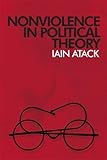Nonviolence in Political Theory / Iain Atack.
Material type: TextPublisher: Edinburgh : Edinburgh University Press, [2022]Copyright date: ©2012Description: 1 online resource (208 p.)Content type:
TextPublisher: Edinburgh : Edinburgh University Press, [2022]Copyright date: ©2012Description: 1 online resource (208 p.)Content type: - 9780748638710
- 9780748633791
- 303.61
- online - DeGruyter
| Item type | Current library | Call number | URL | Status | Notes | Barcode | |
|---|---|---|---|---|---|---|---|
 eBook
eBook
|
Biblioteca "Angelicum" Pont. Univ. S.Tommaso d'Aquino Nuvola online | online - DeGruyter (Browse shelf(Opens below)) | Online access | Not for loan (Accesso limitato) | Accesso per gli utenti autorizzati / Access for authorized users | (dgr)9780748633791 |
Frontmatter -- Contents -- Preface -- Introduction -- 1. The Theory and Practice of Nonviolent Political Action -- 2. Political Theory, Violence and the State -- 3. Nonviolence, the State and Civil Resistance -- 4. Nonviolence and Political Power -- 5. Structure, Agency and Nonviolent Political Action -- 6. Pacifism and Nonviolence -- Conclusion -- Bibliography -- Index
restricted access online access with authorization star
http://purl.org/coar/access_right/c_16ec
Develops a coherent theory of nonviolent political action in the context of Western political theoryGBS_insertPreviewButtonPopup(['ISBN:9780748633777','ISBN:9780748649679','ISBN:9780748633791','ISBN:9780748633784','ISBN:9780748638710']);Ian Atack identifies the contribution of nonviolence to political theory through connecting central characteristics of nonviolent action to fundamental debates about the role of power and violence in politics. This in turn provides a platform for going beyond historical and strategic accounts of nonviolence to a deeper understanding of its transformative potential.From Mahatma Gandhi and Martin Luther King to toppled communist regimes in Eastern Europe and pro-democracy movements in Serbia, Georgia and Ukraine, nonviolent action has played a significant role in achieving social and political change in the last century. The Arab Spring revolutions, particularly those in Tunisia and Egypt, and the Occupy movement in the US and UK demonstrate that nonviolence continues to be a vital feature of many campaigns for democracy, human rights and social justice.Key FeaturesExplores the philosophical presuppositions behind nonviolent political actionExamines the tensions between nonviolence and pacifism in international politicsUses Gramsci and Foucault to critically analyse consent as the basis of political powerDistinguishes between civil resistance and transformative nonviolence"
Mode of access: Internet via World Wide Web.
In English.
Description based on online resource; title from PDF title page (publisher's Web site, viewed 29. Jun 2022)


